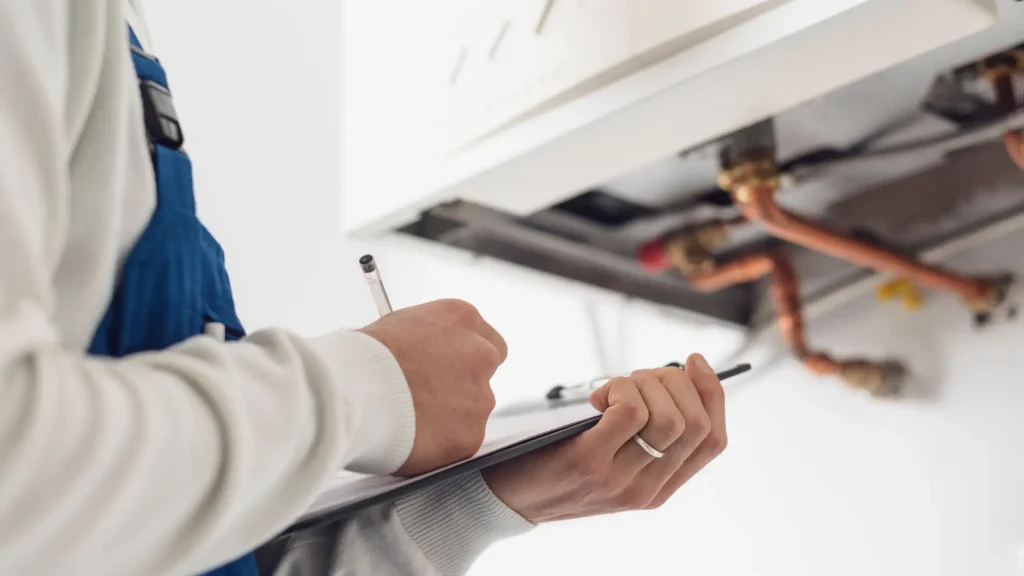Keeping your home cosy during the colder months is essential, but with rising energy bills, many UK residents are looking for ways to make their boiler work smarter, not harder. A crucial factor in achieving this balance is setting the right boiler temperature.
This guide will delve into the ideal temperature settings for UK boilers, considering factors like boiler type, home insulation, and safety. We’ll also explore ways to optimise your heating system for maximum efficiency and cost savings.
Understanding Boiler Temperatures
Before diving into specific temperatures, it’s important to understand what we’re measuring. In a nutshell, a boiler heats water, which then circulates through your radiators or underfloor heating system to warm your home. The temperature we’re concerned with is the flow temperature of this water – essentially, how hot it gets before leaving the boiler.
There are two main boiler types to consider in the UK:
- Conventional Boilers: These have a separate hot water cylinder that stores heated water for taps and showers.
- Combi Boilers: These heat water on demand, eliminating the need for a hot water cylinder.
Ideal Boiler Temperatures
Now, let’s explore some recommended temperature ranges:
Conventional Boilers:
- Heating: For a well-insulated home, a flow temperature of 60-65°C is a good starting point. In older, less insulated properties, you might need to go slightly higher, up to 70°C.
- Hot Water: To prevent bacteria growth, the hot water cylinder thermostat should be set to at least 60°C.
Combi Boilers:
- Heating: Similar to conventional boilers, aim for 60-70°C for well-insulated homes, and potentially a bit higher for older properties. However, combi boilers operate most efficiently in condensing mode, which is achieved at lower temperatures. In milder months (spring and autumn), consider reducing the flow temperature to 50-55°C for better efficiency.
Important Note: These are general guidelines. Always consult your boiler manual for specific recommendations from the manufacturer.
Why Does Temperature Matter?
Setting the right boiler temperature impacts both your comfort and your wallet. Here’s why:
- Efficiency: Higher boiler temperatures mean the boiler works harder, consuming more gas and driving up energy bills. Conversely, lower temperatures allow the boiler to operate more efficiently, leading to cost savings.
- Comfort: While lower temperatures save money, they shouldn’t compromise comfort. Ensure the chosen temperature keeps your home warm enough.
- System Longevity: Extremely high temperatures can put stress on the boiler, potentially shortening its lifespan.
Factors Affecting Ideal Temperature
Several factors influence the ideal temperature for your boiler:
- Home Insulation: Well-insulated homes retain heat better, allowing you to use lower boiler temperatures. Conversely, poorly insulated homes might require slightly higher temperatures to achieve the same level of warmth.
- Radiator Size: Larger radiators can efficiently heat rooms at lower water temperatures. Conversely, smaller radiators might require higher temperatures to provide sufficient heat.
- Weather Conditions: Colder weather naturally demands higher boiler temperatures to maintain comfort.
Tips for Optimising Boiler Efficiency
Here are some additional ways to get the most out of your boiler:
- Get a Boiler Service: Regular servicing ensures your boiler operates efficiently and safely.
- Install a Thermostat: A programmable thermostat allows you to control heating schedules and avoid unnecessary heating when you’re out. Aim for a minimum temperature of around 10°C to prevent pipes from freezing.
- Bleed Your Radiators: Trapped air in radiators can prevent them from heating efficiently. Bleeding them regularly ensures hot water circulates properly.
- Upgrade Old Boilers: Newer boilers are typically much more efficient than older models. Consider replacing a boiler that’s over 10 years old.
- Invest in Insulation: Upgrading loft insulation and cavity wall insulation can significantly improve heat retention and potentially allow you to lower your boiler temperature.
Safety Considerations
When adjusting boiler temperature, prioritise safety:
- Legionnaires’ Disease: The hot water cylinder in conventional boilers needs to maintain a minimum temperature (around 60°C) to prevent the growth of Legionnaires’ disease bacteria. Don’t set the thermostat below this point.
- Qualified Engineer: If you’re unsure about adjusting the boiler temperature yourself, consult a qualified Gas Safe registered engineer.
Conclusion
Finding the right boiler temperature is a balancing act between comfort and efficiency. By understanding your boiler type, home insulation, and safety considerations, you can optimise your heating system for a warm and cost-effective environment. Remember, small adjustments in temperature can make a big difference in your energy bills. For further guidance on boilers, contact All Plumbing Newbury.





